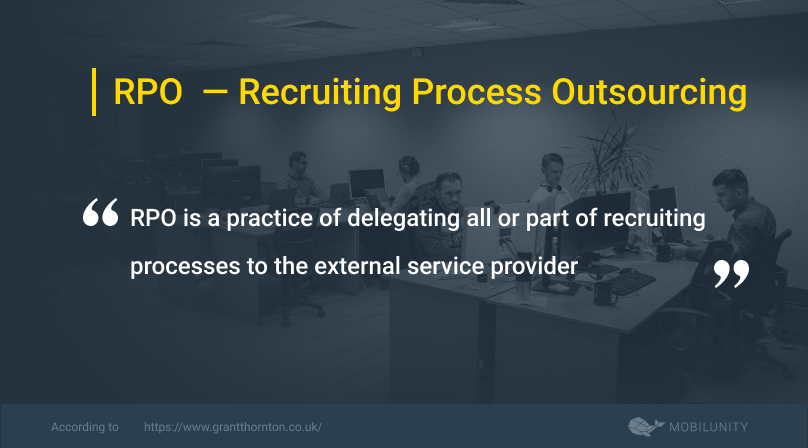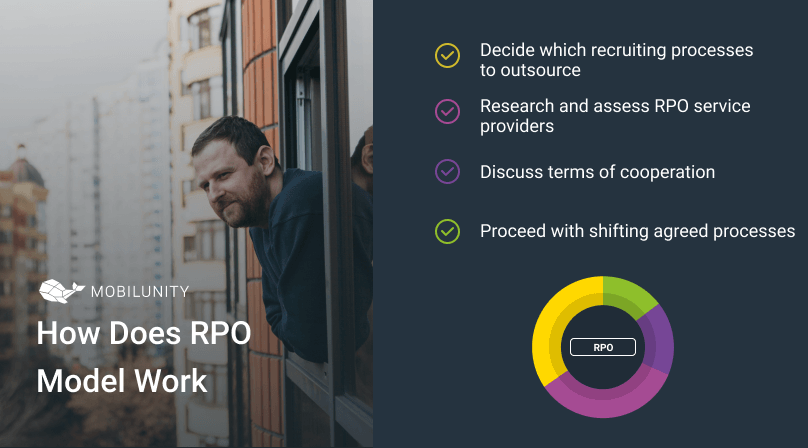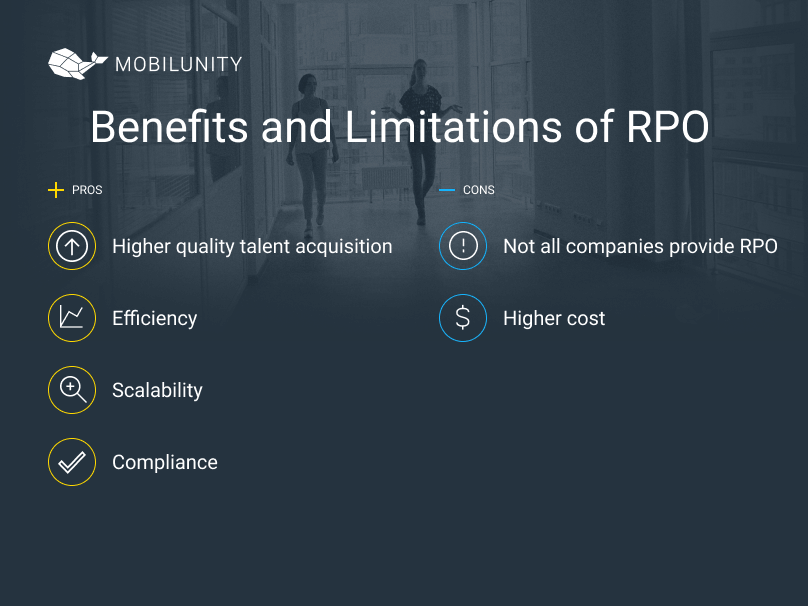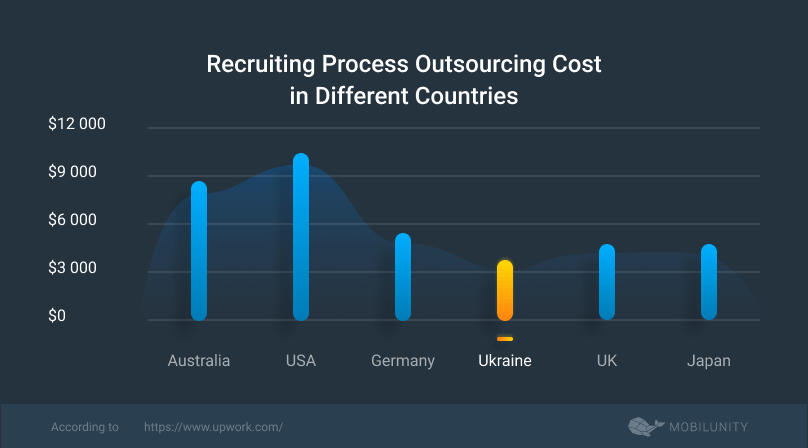RPO (Recruiting Process Outsourcing)

- RPO Definition: Brief History and Use
- RPO Meaning and How It Works for Businesses?
- RPO Vs. Traditional Recruiting: What’s the Difference?
- Typical RPO Services
- The Size of RPO Industry Globally
- Advantages and Drawbacks of Recruiting Process Outsourcing RPO
- Companies That Use RPO Services
- Comparing RPO Services Cost in Different Countries
- References
RPO is a practice of delegating all or part of recruiting processes to the external service provider [1]. An RPO provider ensures permanent recruiting according to the client’s needs and specific requirements to the candidates that have to be hired. A vendor of RPO is responsible for utilizing the latest recruiting technology and taking care of strategic recruiting management to deliver the employees in a timely manner.
RPO Definition: Brief History and Use
The term RPO emerged in the US and UK in the 1990s [1]. However, the real boom of RPO emerged at the beginning of the new century, thanks to the advanced technologies and approaches used in recruiting.
Historically, only large corporations and global brands worked with recruiting process outsourcing companies to hire permanent staff on a regular basis. But what is recruiting process outsourcing nowadays? Today, not only large firms but also many medium-sized companies and startups use RPO services as a part of their business strategy. Top RPO companies have vast experience in providing various recruiting process outsourcing services catered to different business needs.
RPO Meaning and How It Works for Businesses?
The RPO model may vary from one company to another, but there are the essential steps to follow for any business considering hiring an RPO firm:
- Decide which recruiting processes you want to outsource.
- Research and assess the corresponding RPO service providers. Compare their solutions, rates, feedback, and convenience of cooperation (location, time zone, language use).
- Discuss terms of cooperation, including system integration, data security, talent demand, etc.
- Proceed with shifting the agreed processes to the selected vendor.
RPO Vs. Traditional Recruiting: What’s the Difference?
In contrary to traditional recruiting that allows a business to hire in-house employees, RPO means putting the responsibility of hiring remote teams on an overseas outsourcing vendor.
An RPO solution is all about recruiting strategy. The process is not limited to searching for candidates but also recruiting planning, management, and staff retention practices. A reliable and experienced RPO company uses the latest technology to ensure the maximum effectiveness of the permanent talent acquisition, conducts regular data analysis, and provides reports on the effectiveness of the taken measures and possible improvements to implement.
RPO is a working solution for managing a business’s entire recruiting department, building teams in different countries and cities, and dealing with large-scale (department-size) recruiting needs. RPO comes where traditional recruiting proves to be not time- or cost-effective and can save a company a lot of resources and effort.
Typical RPO Services
PRO services can be divided into three typical sets, namely end-to-end RPO, project RPO, and on-demand RPO. Let’s take a look at the differences in the services an RPO company can provide:
End-to-End RPO
End-to-end RPO covers all the company’s recruiting needs and covers a large scope of recruiting services. It is the most effective and cost-saving solution to hire a remote team to execute the project, design a brand new product, and implement the latest technologies. End-to-end RPO also increases the value of employer branding and the company’s reputation.
Project RPO
Project RPO utilizes all the end-to-end processes needed in terms of a single project. These services prove to be beneficial when there’s a need to find experts to fill an unexpected open vacancy or hiring a whole new department for the company (sales, digital marketing, etc.)
On-Demand RPO
On-demand RPO is similar to Project one but is used for short-term tasks. Thus, RPO recruiters assist your company for a short period to find and hire the experts you need. It allows solving a recruiting problem quickly, but the benefits are not as extensive as when requesting End-to-end RPO with employer branding and technology transformation provided.
The Size of RPO Industry Globally
The global RPO market was estimated at more than $5bn in 2017 and is projected to grow with an annual rate of 14.4% by 2025 [2]. With the rapid technology development and the need for experts in different fields, the RPO industry is growing exponentially, and more and more middle- and large-scale companies [3] turn to recruiting process outsourcing RPO.
The most popular RPO activities include sourcing, screening, interviewing, and assessing candidates, among others [4]. Typically, the mix of RPO services is tailored for the specific recruiting requirements of the client.
Advantages and Drawbacks of Recruiting Process Outsourcing RPO
Among the benefits and issues that RPO poses are the following:
- Higher quality talent acquisition. Thanks to the latest technology and advanced screening and assessing, RPO allows for attracting and hiring real experts needed for your business.
- Efficiency. An RPO company constantly analyzes and improves recruiting processes to ensure maximum effectiveness at an optimal cost.
- Scalability. Recruiting process outsourcing services allow for hiring talents for different branches, departments, locations simultaneously and effectively.
- Compliance. You can be sure that the recruiting processes are tailored to your company’s needs.
However, there are some limitations to consider when inquiring for RPO consulting:
- Not all companies provide recruiting process outsourcing services. There are some companies that don’t go beyond traditional recruiting, so you need to check carefully whether the selected service provider uses the latest technology and RPO approaches before signing for their solutions.
- Higher cost compared to traditional recruiting.
Companies That Use RPO Services
Many corporations have successfully used RPO approaches. For example, General Electrics [5] has implemented recruiting process outsourcing services for efficient hiring of tech talents and innovating its employee management system.
Cisco [6] used RPO to hire 15,000 employees a year to expand to the Asian market and fill vacancies globally. Thanks to the recruiting process outsourcing services, the company was able to cut hiring costs in half.
Whirlpool [6] managed to optimize the time to fill a vacancy, quality of the talent pool, and user satisfaction, thanks to advanced RPO solutions.
Comparing RPO Services Cost in Different Countries
RPO implementation cost mainly depends on the scale and specifics of the project. Also, the industry and the model used to matter, too. Taking into account RPO software cost and talent acquisition services price in different countries, we can compare the cost based on Upwork rates [7]:
| The US | The UK | Germany | Australia | Japan | Ukraine | |
| Cost per month ($) | $10,400 | $4,800 | $5,760 | $8,800 | $4,800 | $3,200 |
Since outsourcing is about efficiency and cost-effectiveness, many businesses tend to outsource their recruiting processes to Ukrainian firms [7] known for their expertise and dedication [8].
See Also
References
- https://www.grantthornton.co.uk/globalassets/1.-member-firms/united-kingdom/pdf/documents/recruitment-process-outsourcing-2018.pdf
- https://www.businesswire.com/news/home/20170919005968/en/Global-Recruitment-Process-Outsourcing-RPO-Market-2017-2025
- https://techcrunch.com/2016/10/29/the-history-of-innovation-in-recruitment-technology-and-services
- https://mobilunity.com/blog/recruitment-process-outsourcing
- https://www.hrdive.com/news/ge-refocused-recruiting-strategy-to-bring-in-top-tech-talent/438149
- https://hroutsourcinginsights.wordpress.com/tag/talent-acquisition
- https://www.upwork.com/search/profiles/?q=rpo%20(recruitment%20process%20outsourcing)&loc=united-states
- https://www.kearney.com/digital-transformation/gsli/2019-full-report









